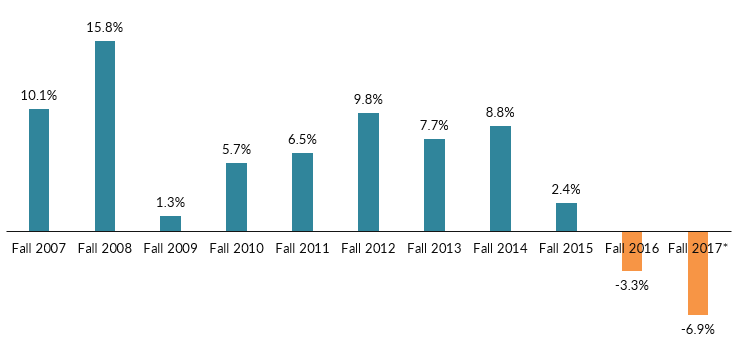Hello all,
Today we will be talking about a potential example of human capital flight that doesn't match the typical cases we cite in the topic synopsis, and how it may tie into the phenomenon we touched upon called "reverse brain drain." Experts and media are increasingly recognizing the effects of President Trump's new restrictive immigration and visa policies and its potential effect on skilled talent.
The United States has long been a desirable destination for the world's top students. US higher education has dominated top college rankings for decades, and American scientists are represented highly in academic and scientific recognition, such as Nobel Prizes. International talent from around the world flocks to the US, and the number of new international student enrollment has consistently increased every year - that is, until fall of 2016. It dropped once again next year, and early data looks to support this trend for the upcoming fall of 2018.
While it is likely that there are multiple factors behind this decrease, economists like Anne Kreuger criticize Trump's policies as harming one of the United States' largest major export industries: its education. Signs of talent deficit are already beginning to rise in innovational areas like Silicon Valley.
So what about the current foreign studying in the United States who may be unable to obtain a work visa and consequently will return back to their home countries?
This is a good example of "reverse brain drain," a phenomenon that some economists use to justify that brain drain ends up a net benefit for the origin nation. When highly skilled workers return to their home country, they now have a much more developed skillset and experience to use to start businesses, teach at universities, etc. In fact, some of the world's leading nations have previously adopted policies to specifically encourage this reverse migration, and could be an interesting starting point for some ideas to address our second topic.
Here are some links to information mentioned above!
Anne Kreuger on Trump Brain Drain:
https://www.project-syndicate.org/commentary/trump-foreign-students-us-universities-by-anne-krueger-2019-01
International Students in the US:
https://www.migrationpolicy.org/article/international-students-united-states
Reversing the Brain Drain in Pakistan:
https://ssir.org/articles/entry/reverse_the_brain_drain

Hi! My name is Kareena Dhillon and I am representing the United States in this debate. I found this article very interested and it helped guide me in my research, thank you!
ReplyDeleteHi! My name is Julie de Vaulx and I will be representing the United Kingdom, along with Jacob Jackson.
ReplyDeleteWhile the United Kingdom has not experienced any important brain drain yet, we are expecting this to change in the wake of Brexit, at least regarding European immigrants and students. We have 15 universities in the top 100 internationally, the second most after the United States and the most in the European region. These include the University of Oxford and the University of Cambridge, both of whom have been seen at the top of the list according to The Times. It is therefore evident that the probable decrease in the number of European PHDs applicants in the UK would not only be a loss to us, but also to the international community if people are less likely to seek the best education possible due to political crises. This is why the UK has made it easier for current European students to extend their visas, so they can keep studying in the world’s top universities.